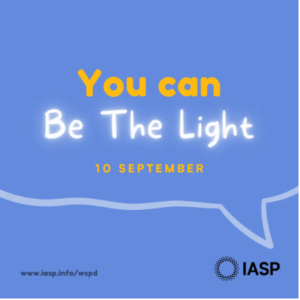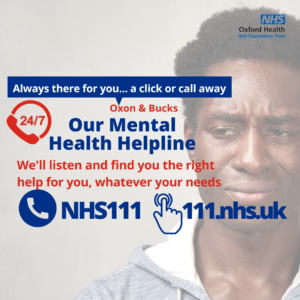Creating Hope through Action is a reminder that there is an alternative to suicide. The campaign aims to inspire confidence and light in all of us; that our actions, no matter how big or small, may provide hope to those who are struggling. Preventing suicide is often possible and you are a key player in its prevention. Through action, you can make a difference to someone in their darkest moments – as a member of society, as a child, as a parent, as a friend, as a colleague or as a neighbour. We can all play a role in supporting those experiencing a suicidal crisis or those bereaved by suicide.
Suicidal thoughts are complex. No single approach works for everyone. What we do know is that there are certain factors and life events that may make someone more vulnerable to suicide and mental health conditions such as anxiety and depression can also be a contributing factor. People who are suicidal may feel trapped or like a burden to their friends, family and those around them and thus feel like they are alone and have no other options. The COVID-19 Pandemic has contributed to increased feelings of isolation and vulnerability. By creating hope through action, we can signal to people experiencing suicidal thoughts that there is hope and that we care and want to support them.
 Reach in
Reach in
You can help give someone hope by showing that you care. All of us can play a role, no matter how small. We may never know what we do that makes a difference. We all can reach in and ask somebody. You do not need to tell them what to do or have solutions, but simply making the time and space to listen to someone about their experiences of distress or suicidal thoughts can help. Small talk can save lives and create a sense of connection and hope in somebody who may be struggling.
Understanding
Stigma is a major barrier to seeking help. Changing the narrative around suicide through the promotion of hope can create a more compassionate society where those in need feel more comfortable in coming forward to seek help. We can all do something to live in a world where suicide is recognised and we can all do something to help prevent it.
Sharing experiences
 The insights and stories of people with a lived experience of suicide can be extremely powerful in helping others understand suicide better and encourage people to reach in to support someone, and for individuals to reach out for help themselves. It’s really important that the person sharing their story knows how to do so in a way that is safe for them and for those who hear their story. Personal stories of an individual’s experiences of significant emotional distress, suicidal thoughts or attempt, and their experiences of recovery being bereaved by suicide can inspire hope in others that they too can move through the period of distress or crisis, and their insights can help others understand what it means to feel suicidal and how they can support others.
The insights and stories of people with a lived experience of suicide can be extremely powerful in helping others understand suicide better and encourage people to reach in to support someone, and for individuals to reach out for help themselves. It’s really important that the person sharing their story knows how to do so in a way that is safe for them and for those who hear their story. Personal stories of an individual’s experiences of significant emotional distress, suicidal thoughts or attempt, and their experiences of recovery being bereaved by suicide can inspire hope in others that they too can move through the period of distress or crisis, and their insights can help others understand what it means to feel suicidal and how they can support others.
Support
Samaritans can be contacted any time from any phone for FREE at 116 123 or by email jo@samaritans.org
Support after Suicide: If you or someone you know has been affected by suicide, please see https://supportaftersuicide.org.uk/ for support.
Oxford Health’s 24/7 Mental Health Helplines
 Oxford Health’s 24/7 mental health helplines with trained advisors are there to help in all regions covered by Oxford Health – this includes Buckinghamshire, Oxfordshire, Swindon, Wiltshire and Bath & North East Somerset.
Oxford Health’s 24/7 mental health helplines with trained advisors are there to help in all regions covered by Oxford Health – this includes Buckinghamshire, Oxfordshire, Swindon, Wiltshire and Bath & North East Somerset.
Oxfordshire & Buckinghamshire adults and young people
Ring NHS 111 or visit 111.nhs.uk and you will have contact with an adviser who will direct you to appropriate care and support.
For children and young people (not adults)
Bath and North East Somerset:
- Weekdays 9am to 5pm – call 01865 903889
- Out of hours and weekends – call 01865 901000
Wiltshire:
- Weekdays 9am to 5pm – call 01865 903330
- Out of hours and weekends – call 01865 901000
Swindon
- Weekdays 9am to 5pm – call 01793 463177
- Out of hours and weekends – call 01865 901000
Published: 8 September 2022

